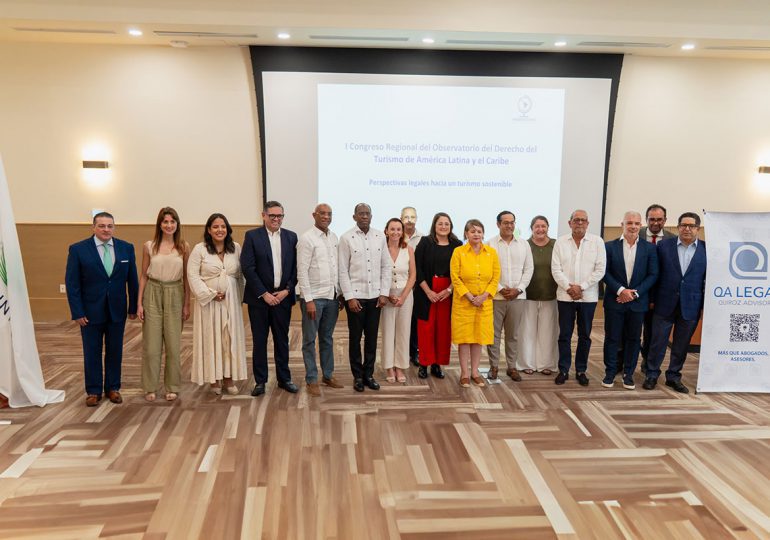Punta Cana — Legal experts in tourism and key stakeholders in sustainability, airport operations, and governance gathered in Punta Cana for the inaugural Regional Congress of the Tourism Law Observatory for Latin America and the Caribbean, aimed at exploring the legal frameworks needed to drive sustainable tourism in the region.
Held from July 14 to 16 under the theme “Legal Perspectives Toward Sustainable Tourism”, the event was organized by UN Tourism, Grupo Punta Cana, and Quiroz Advisors – QA Legal, bringing together dozens of national and international professionals and authorities.
The congress served as a platform to analyze key challenges and opportunities related to sustainability, territorial governance, regulation, and tourism management, with a focus on identifying actionable legal tools to strengthen the sector’s competitiveness and resilience.
Alicia Gómez, Director of the Department of Legal Affairs and International Standards at UN Tourism, opened the event by underscoring the need for clear legal frameworks, inclusive governance models, and a holistic focus on sustainability—including economic, social, and environmental dimensions.
“The law must be used as a tool to shape more resilient and sustainable tourism destinations,” Gómez stated.
José Quiroz, Managing Partner at QA Legal, emphasized that the congress aimed to facilitate the exchange of ideas and best practices on crucial tourism issues, including sustainability regulations, land-use governance, short-term rentals, accessible tourism, and access to green financing.
“Only through regional collaboration can we create tourism destinations that are fair, competitive, and resilient,” Quiroz said.
Welcoming attendees, Yudith Castillo, Legal Director of Grupo Punta Cana, expressed gratitude to UN Tourism for selecting the Dominican Republic—and specifically Puntacana Resort & Club—to host the congress. She highlighted the importance of convening global experts to develop proposals that strengthen tourism in a rapidly evolving landscape.
In addition to panel discussions, the event included a specialized training program for private-sector stakeholders, offering practical guidance on international standards for accessible tourism.
A post-conference session, hosted with the Development Bank of Latin America (CAF) and the Inter-American Development Bank (IDB), focused on how green investments can fuel sustainable economic growth in tourism, encouraging a more inclusive and environmentally responsible approach to development.
Among the notable attendees were Ecuador’s Minister of Tourism, Mateo Estrella; Dominican Republic’s Vice Minister of Tourism, Carlos Peguero; and Francisco Solimán from the Ministry of Housing, alongside representatives from business associations including ASONAHORES, ADETI, ASOLESTE, and leaders from the private sector, academia, and banking.
UN Tourism will release the event’s key takeaways and the future agenda of the Tourism Law Observatory through its official channels.

